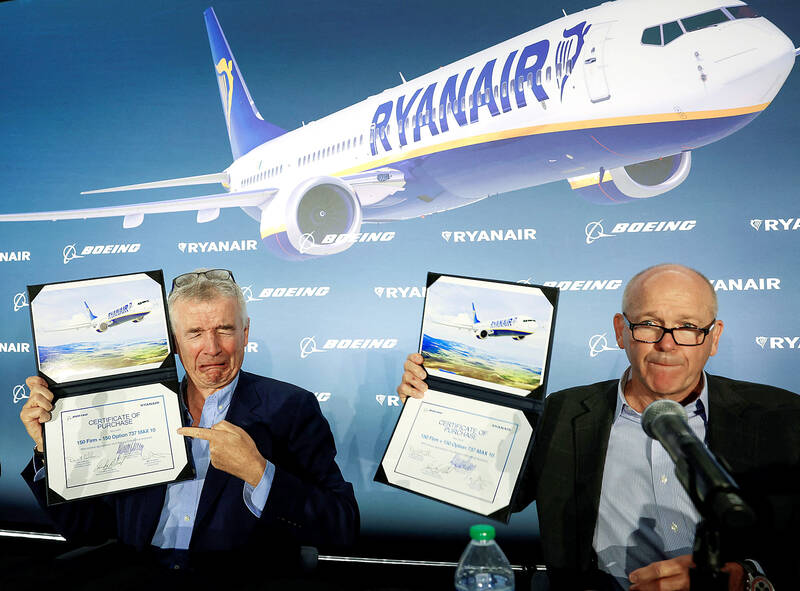Irish airline Ryanair Holdings PLC on Tuesday ordered 300 Boeing Co 737 Max jets with a list price of more than US$40 billion, representing the US aerospace giant’s latest big contract in a fast-recovering aviation market.
The announcement, comprising 150 firm orders plus 150 options for new fuel-efficient aircraft, represents “the largest order ever placed by an Irish company for US manufactured goods,” Ryanair said in a statement, as it is eyeing big growth over the next decade.
The jets are set for delivery between 2027 and 2033. Airlines traditionally negotiate substantial discounts on list prices, especially for big orders.

Photo: Reuters
Executives did not release the financial details of the transaction, but Ryanair chief executive Michael O’Leary described the agreement as a “win-win” in an interview held jointly with Boeing chief executive Dave Calhoun.
The Dublin-based carrier said the deal would be subject to shareholder approval at its annual general meeting in September, owing to the size and scale of the transaction.
The order covers Boeing’s new 737 Max-10 aircraft, which have 228 seats, about 20 percent more than the current generation of comparable Boeing jets, O’Leary said.
At a signing event at Boeing’s Arlington, Virginia, headquarters, O’Leary said that the new aircraft “boast lower costs” that would be passed on “in the form of lower airfares, therefore driving our growth.”
Ryanair added that the new 228-seater jets, alongside a major recruitment drive, would help facilitate a surge in passenger numbers.
The carrier, which specializes in competitively priced short and medium-distance trips within Europe, is targeting an 80 percent jump in annual passenger traffic to 300 million travelers by 2034, compared with this year.
It plans to recruit more than 10,000 new cabin crew members, engineers and pilots to help meet the goal. The company hopes to garner a 30 percent share of the European market.
The deal is the latest lift for Boeing, which is emerging from a major slump due to the COVID-19 downturn and the lengthy grounding of the 737 Max after two fatal crashes.
Calhoun said he was confident that Boeing would meet the terms of the contract.
When Boeing presented its long-term outlook in November last year, the US manufacturer anticipated the logistics difficulties that have dogged the industry during the COVID-19 pandemic would improve this year and next year.
“And that is what’s been happening,” Calhoun said on Tuesday.
He also characterized the US Federal Aviation Administration’s certification process for the Max-10 as on track.
“No technical issues have arisen such that there’s a concern that we won’t be able to resolve,” Calhoun said.
“It’s documentation, documentation, documentation,” he said.

Intel Corp chief executive officer Lip-Bu Tan (陳立武) is expected to meet with Taiwanese suppliers next month in conjunction with the opening of the Computex Taipei trade show, supply chain sources said on Monday. The visit, the first for Tan to Taiwan since assuming his new post last month, would be aimed at enhancing Intel’s ties with suppliers in Taiwan as he attempts to help turn around the struggling US chipmaker, the sources said. Tan is to hold a banquet to celebrate Intel’s 40-year presence in Taiwan before Computex opens on May 20 and invite dozens of Taiwanese suppliers to exchange views

Application-specific integrated circuit designer Faraday Technology Corp (智原) yesterday said that although revenue this quarter would decline 30 percent from last quarter, it retained its full-year forecast of revenue growth of 100 percent. The company attributed the quarterly drop to a slowdown in customers’ production of chips using Faraday’s advanced packaging technology. The company is still confident about its revenue growth this year, given its strong “design-win” — or the projects it won to help customers design their chips, Faraday president Steve Wang (王國雍) told an online earnings conference. “The design-win this year is better than we expected. We believe we will win

Chizuko Kimura has become the first female sushi chef in the world to win a Michelin star, fulfilling a promise she made to her dying husband to continue his legacy. The 54-year-old Japanese chef regained the Michelin star her late husband, Shunei Kimura, won three years ago for their Sushi Shunei restaurant in Paris. For Shunei Kimura, the star was a dream come true. However, the joy was short-lived. He died from cancer just three months later in June 2022. He was 65. The following year, the restaurant in the heart of Montmartre lost its star rating. Chizuko Kimura insisted that the new star is still down

While China’s leaders use their economic and political might to fight US President Donald Trump’s trade war “to the end,” its army of social media soldiers are embarking on a more humorous campaign online. Trump’s tariff blitz has seen Washington and Beijing impose eye-watering duties on imports from the other, fanning a standoff between the economic superpowers that has sparked global recession fears and sent markets into a tailspin. Trump says his policy is a response to years of being “ripped off” by other countries and aims to bring manufacturing to the US, forcing companies to employ US workers. However, China’s online warriors